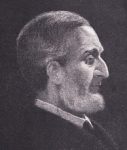 We continue with extracts from Benjamin Wills Newton’s book, Prospects of the Ten Kingdoms, the chapter 6 — THOUGHTS ON THE HISTORY OF PROFESSING CHRISTIANITY, AS GIVEN IN THE PARABLES OF MATTHEW XIII.
We continue with extracts from Benjamin Wills Newton’s book, Prospects of the Ten Kingdoms, the chapter 6 — THOUGHTS ON THE HISTORY OF PROFESSING CHRISTIANITY, AS GIVEN IN THE PARABLES OF MATTHEW XIII.
I would commend a close reading of these extracts for they deal with the very issue of ‘decay within Christendom’ that we see all around.
Here is Part 5, which covers pages 165-169.
Click here to see the other articles about this book.
The parables of our Lord are addressed chiefly to conscience. If our consciences are perverted we shall either give no heed to the instruction, or else mistake, and probably, reverse the meaning. For example, he who conceives the honour and dignity of this present age to be according to God, and therefore well suited for His Church, will be sure to find in the parable of the “mustard seed” an encouragement to aspire after worldly greatness. He who admires the present condition and influence of professing Christianity, will not be hindered by the mere circumstance of leaven being uniformly used in the Scripture as the type of evil, from interpreting it as the symbol of the diffusiveness and diffusion of good. Parables, if they do not enlighten, blind.* (more…)
